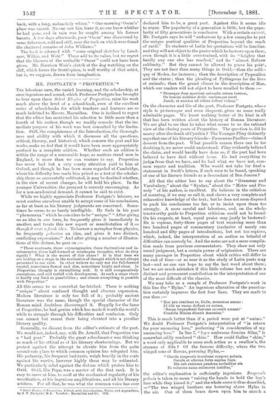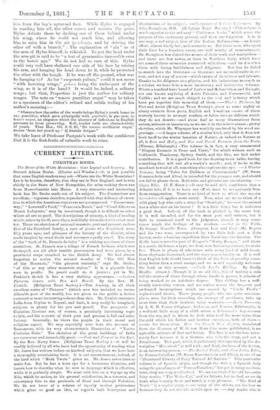MR. POSTGATE'S " PROPERTIUS."* THE laborious care, the varied learning,
and the scholarship, at -once ingenious and sound, which Professor Postgate has brought
• to bear upon these Select Elegies of Propertius, raise his work much above the level of a school-book, even of the excellent
series of school-books for which teachers and learners are so much indebted to Messrs. Macmillan. One is inclined to regret that the editor has restricted his selection to little more than a fourth of his author, though we readily concede that the im- mediate purpose of his work was best consulted by the limita- tion. Still, the completeness of the Introduction, the thorough- ness and ability with which it discusses all the questions, critical, literary, and historical, which concern the poet and his works, make us feel that it would have been more appropriately prefixed to a complete edition. Whether such an edition is within the range of a reasonable hope, as matters stand now in
England, is more than we can venture to say. Propertius has never had but a very scanty attention paid to him at Oxford, and though he has been more regarded at Cambridge, where his difficulty has made him prized as a test of the scholar- ship there so successfully cultivated, it may be doubted whether, in the view of recent changes, he will hold his place. In the younger Universities, the prospect is scarcely encouraging. As -for a non-academical demand, it cannot be said to exist.
While we highly appreciate Professor Postgate's labours, we must confess ourselves unable to accept some of his conclusions,
as far at least as his literary judgments are concerned. Some- times he seems to us barely intelligible. He finds in his poet -" phenomena " which he considers to be "unique." "After giving is an idea in one form, he frequently gives it immediately in another, and treats this new aspect or manifestation of it as though it were a fresh idea. To borrow a metaphor from physics, he frequently polarizes an idea, and gives it two distinct, -conflicting expressions." And after giving a number of illustra- tions of this dictum, he goes on :— "These contrasts, these extravagancies, these fluctuations and in- coherencies, these half-formed or misshapen thoughts, what do they signify ? What is the secret of this chaos ? It is that here we -are looking on a stage in the realisation of thought which is not always presented to our view. In other writers we only see the full-formed crystal, sometimes flawed and dim, sometimes bright and clear. In Propertius, thought is crystallising still. It is still comparatively amorphous, and still turbid with development. At such a stage there is hardly any limit to possibilities ; and almost everything is possible with Propertius."
All this seems to us somewhat far-fetched. There is nothing ."
unique" about confused thought and obscure expression. Modern literature is only too full of it ; probably ancient literature was the same, though the special character of the Roman mind doubtless discouraged it. Happily for the fame of Propertius, he had genius which has made it worth the world's while to straggle through his difficulties and confusion. Only one cannot but resent their being elevated into a peculiar literary quality.
Generally, we dissent from the editor's estimate of the poet. We would not, indeed, say, with Dr. Arnold, that Propertius was a "bad poet." Probably the great schoolmaster was thinking as much of his ethical as of his literary shortcomings. But we protest against the attempt to elevate him from the quite second-rate place to which common opinion has relegated him. His pedantry, his frequent bad-taste, weigh heavily in the scale against his merits, however highly these may be estimated. We particularly rebel against the dictum which prefers him to Ovid. Ovid, like Pope, was a master of the first rank. It is easy to sneer at him, to scoff at the mechanical regularity of his versification, at his ingenious amplifications, and all his literary artifices. For all that, he was what the common voice has ever
• Select Elegies nj Propertius. Edited, with Introduction, Notes, and Appendices, by J. P. Postgate, MA. - London : Macmillan and Co. 1831. back with a long, melancholy whine." "One morning 4 Oscar's' declared him to be, a great poet. Against this it seems idle to argue. The popularity of a generation is little, but the popu- larity of fifty generations is conclusive. With a certain naireti, Mr. Postgate says he will "endeavour by a few examples to put the unique poetical qualities of Propertius beyond the reach of cavil." To students of Latin his quotations will be familiar, and they will not object to the praise which be bestows upon them, even though it is a little overstrained, with its "heights that hardly any one else has reached," and its 4. almost Hebrew sublimity." But they cannot be allowed to prove his poin4. They are not finer than many things in Ovid,—than the solilc- quy of Medea, for instance ; than the description of Pygmalion and the statue ; than the pleading of Pythagoras for the lives of animals; than the grand climax in the description of Man, which our readers will not object to have recalled to them :— " Pronaque dum spectant animalia cetera terram,
Os bomini sublime dedit, caelumque tueri Jussit, et erectos ad sidera tollere voltu,s."
On the character and life of the poet, Professor Postgate, whose style is picturesque and even eloquent, gives us some really admirable pages. We know nothing better of its kind in all that has been written about the history of Roman literature. We are glad to see that he takes what seems to us the rational view of the closing years of Propertius. The question is, did he marry after the death of Cynthia ? The Younger Pliny distinctly says that one of his literary friends—Passennus Paullus—claimed descent from the poet. What possible reason there can be for doubting it, we never could understand. Pliny evidently believed the claim, and would hardly have done so, if the poet had been believed to have died without issue. He had everything ta judge from that we have, and he had what we have not, com- mon repute and tradition. Who would not take for final a statement in Swift's letters, if such were to be found, speaking of one of his literary friends as a descendant of Ben Jonson All that the editor has to say about the "Grammar and Vocabulary," about the "Syntax," about the "Metre and Pro- sody" of his author, is excellent. He believes in the criticism of counting, if we may so call it, and shows a very complete and exhaustive knowledge of the text ; but be does not seem disposed to push his conclusions too far, or to insist upon them too strongly. A more careful and laborious, and, on the whole, trustworthy guide to Propertian criticism could not be found. On his exegesis, at least, equal praise may justly be bestowed. He is copious, forty-three pages of text receiving more than two hundred pages of commentary (exclusive of nearly one hundred and fifty pages of introduction), but not too copious, which, indeed, the interpretation of an author so brimful of difficulties can scarcely be. And the notes are not a mere compila- tion made from previous commentators. They show not only sound judgment, but a certain power of origination. There are many passages in Propertius about which critics will differ to the end of time—or as near it as the study of Latin poets may last—and no one can hope to say the last word about them ; but we are much mistaken if this little volume has not made a distinct and permanent contribution to the interpretation of one of the most difficult of the classics.
We may take as a sample of Professor Postgate's work in this line the " Hylas." An ingenious alteration of the punctua- tion certainly improves the first four lines. They are made to run thus :—
"Hoc pro continuo te, Galle, monemns amore : Id tibi ne vacuo defluat ex animo,
Saepe imprudenti fortuna occurrit amanti' Crudelis Mining dixerit Ascanins."
This is much better than if a period were put at " animo." We doubt Professor Postgate's interpretation of "in return for your unceasing love," preferring "in consideration of my unceasing love." In line 7, "leges umbrosae flumina Silae," is somewhat oddly rendered " skim." How could Gallus "skim," a word only applicable to some such action as a swallow's, the streams of Sila P Of the famous difficulty, where the two winged sons of Boreas, pursuing Hylas,—
" Oscula snspensis instabant carpere palmis, Oscula et alterna Ferro supine. fuga. Ille sub extrema pendens secluditur ata Et volncres ramo submovet insidias," the editor's explanation is sufficiently ingenious. Suspensis palmis is taken to mean "raising the hands to hold the boy's face while they kissed it ;" and the whole scene is thus described,
"The two winged brothers are hovering above Ryles in the air. One of them bears down upon him to snatch a
kiss from the boy's upturned face. While Hylas is engaged
in warding him off, the other comes and secures the prize. Hylas defeats them by dashing one of them behind under his wing, where he could not reach him, and allowing him to raise him in the air (pendeas); and by driving the other off with a branch." - The explanation of " ala " as of
the arm of Hylas himself, is ridiculed. To put tha head under the arm-pit is said to be a feat of gymnastics impossible even in the heroic age." We do not feel so sure of this. Hylas could very well have sheltered one side of his face by raising his arm, and hanging his head down to it, while he protected
the other with the bough. If he was off the ground, what was he hanging to? As for " suspensis palmis," could it not mean "with hovering wings," palm a being the under-part of the wing, as it is of the hand ? It would be, indeed, a solitary
usage ; but then, Propertius is just the author for solitary usages. The note on " tenero pueriliter ungui" may be taken as a specimen of the editor's refined and subtle feeling of his author's meaning :—
" Observe bow the order of the words brings Hylas's youth home to us; puers/titer, which goes principally with praetulit, is put next to tenero ungui, an elegance which the absence of inflexions in English prevents us from preserving. Soft, tender nails are characteristic of youth. Thus for., Od. 3, 6, 24., De tenero meditatur ungui,' means 'from her youth up :' 4 Itraahiv Ope/xo.w."
We take leave of Professor Postgate's work with the confidence that it is the first-fruits of valuable work to come.







































 Previous page
Previous page